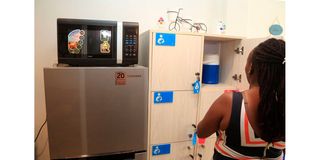Inside the cosy lactation room for Kenya Power mums

A staff member at Kenya Power offices uses the lactation room and facilities in Kisumu on November 15, 2023.
What you need to know:
- The room is fully furnished to address the needs of breastfeeding mothers: a chair for a nanny, a table, a refrigerator, an air conditioner, a tap, a sink and a water dispenser.
- Breastfeeding mothers are allowed to either bring their children to work alongside their nannies, or have the baby brought to work at different intervals.
When Nancy Manono delivered her third born in 2018, one would have thought she had mastered the art of motherhood.
However, top on her list of nightmares was her three-month maternity leave that was ending soon.
The bond she had developed with the child was blissful and resuming work soon would mean many hours away from him, she said. Also, her paediatrician’s instructions to have the baby exclusively breastfed for six months was under serious threat.
Ms Manono, the third assistant engineer at Kenya Power offices in Kisumu, narrated that her efforts to have a breast pump – and continually express milk – would go in vain as the baby would refuse to take it.
“When I came back from work, I was informed that the baby had refused to take the expressed milk and stayed on an empty stomach the better part of the day.”
The following days were not easy either. The house help would struggle to feed the baby who was always crying out of hunger.
Scared of starving the newborn, the mother of three sought advice. She was told to avoid expressing milk and instead breastfeed.
Dilemma
But how was this possible when her workplace did not provide a room to hold the babies temporarily as their parents worked?
After consulting some of her friends, she resorted to leaving work a few minutes before midday, breastfeeding the baby, and getting back to work before the afternoon session.
“Most of the time, I would report to work late as I had to ensure the baby was well fed before I left for work,” Ms Manono says.
This left her with lots of pending work as she juggled between motherhood and career. Resigning was not an option as there were responsibilities to take care of and this was only possible if she had a job. On the other hand, her baby had to be well fed.
“While I had a vehicle, the distance between my workplace and home was quite far. Sometimes I could also get held up by other unavoidable responsibilities; this affected my performance.”
Ms Manono is among thousands of career women in Kenya who find themselves struggling to balance their career and taking care of their newborns.
In a number of workplaces, expectant mothers are granted three-month leave to deliver and take care of their newborns. After the break, they report back, working half or full day, depending on the workload.
“The next three months after resuming my duties were never easy. Most of the time, I was too tired in the evenings and was always looking forward to the weekends,” says Ms Manono, adding that the challenge was one of the reasons she made up her mind not to have another baby.

A staff member at Kenya Power offices uses the lactation room and facilities in Kisumu on November 15, 2023.
Earlier this month, Kenya Power launched a lactation room in its Kisumu offices to ensure continuous productivity among female staff after childbirth.
In an interview, Kenya Power Kisumu County Business Manager Daniel Okumu said the room was established to offer privacy during breastfeeding.
He said breastfeeding mothers are allowed to either bring their children to work alongside their nannies, or have the baby brought to work at different intervals.
With the launch, the 97 female workers at the offices are assured of their babies’ feeding programme throughout the six-month exclusive breastfeeding period.
The room, based on the second floor, has been fully furnished to address the needs of breastfeeding mothers. At the entrance is a couch where a nanny can sit while taking care of a child before breastfeeding hours. The room is partitioned into three private sections, each equipped with a chair and a table.
According to Ms Manono, each partition is designed to host one mother for private breastfeeding. At the centre is a refrigerator used to store expressed milk and a microwave for warming baby food.

The lactation room and facilities at the Kenya Power offices in Kisumu on November 15, 2023.
Next to the refrigerator is a cabinet for storing the food until feeding time. For the comfort of nursing mothers, each is equipped with an air conditioner, a tap, a sink and a water dispenser.
Opposite the refrigerator are clear instructions, hanging on a wall, on how to store expressed milk and the storage limit.
“There had been concerns that we are losing out on mom hours. The laws of the country require that a new mom works half a day; with this facility, however, the female workers can still attend to the babies while working,” Mr Okumu said.
Ms Manono said a staff member from her department was among those using one of the partitions. She had just resumed duty when her house help quit.
The mother, determined to keep her job, hurriedly looked for a new help, who would accompany her to babysit the newborn. The mother would be visiting once in a while to breastfeed and check on the baby.
“With the lactation room, we are also assured of the baby’s wellbeing, a mother has time to check on the baby herself and the colleagues around can help in case of any challenge,” Ms Manono said.

The lobby of the lactation room at the Kenya Power offices in Kisumu on November 15, 2023.
Kisumu County Gender executive Beatrice Odongo lauded the company for the development, saying it will present female workers with an opportunity to grow.
Ms Odongo is now calling on the government and private organisations to abide by the new law passed by the National Assembly requiring organisations to create lactation spaces for breastfeeding mothers.
“'The move is worth being emulated, we need to create private rooms where women can feed their babies or lactate to reduce pressure in their breasts,” she said.
During the 2023 World Breastfeeding Week, the Pan-American Health Organization raised concerns that more than half a billion working women are not given essential maternity protection in national laws.
According to the organisation, fewer than half of children under six months of age are exclusively breastfed. This year’s World Breastfeeding Week was marked under the theme: “Let’s make breastfeeding and work, work!”





